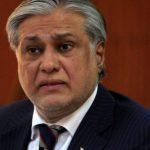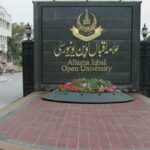ISLAMABAD, Aug 7 (APP): Prime Minister Shahid Khaqan
Abbasi Monday said he wanted the parliament to examine
the issue of Articles 62 and 63 of the Constitution.
He said he would hold consultations with other
political parties over the issue, which had been
lingering on for a quite long time.
The issue, he said, came up whenever a constitutional
amendment was brought forth. He wanted the parliament to
examine it as there were a lot of ambiguities in its
implementation with ample twists.
“A clarity is required on the issue. The House has to
examine it,” he said in his an interview with Aaj News talk
show “Spotlight with Munizae Jahangir”.
The prime minister underlined the need for developing a
consensus among the political parties over the issue and said
he had already witnessed unity in opinion of different
parties.
“I will approach parties to get clarity over its usage,”
he maintained.
The prime minister referring to the ambiguities in the
constitutional articles also expressed his wonder that even a
person who failed to declare an account by mistake could be in
jeopardy.
He cited the disqualification of former prime minister
Muhammad Nawaz Sharif by saying that the aforementioned article
was invoked for not withdrawing salary from his son’s company.
The Constitution was a living document and it could be
amended in view of the changing scenarios, he added.
This was the maiden appearance of the newly-elected
Prime Minister Shahid Khaqan Abbasi in any TV talk show after
he assumed the office on August 1, after the disqualification
of Muhammad Nawaz Sharif by the Supreme Court.
Article 62 deals with qualifications for the membership
of Parliament whereas Article 63 envisages disqualification
clauses for a member of the parliament.
The prime minister also stressed upon developing a
political consensus among all the stakeholders.
The charter of democracy should be revived by including
all the political parties as it was needed by the country, he
said and expressed the optimism that it could be reached prior
to the next general elections.
The prime minister said the PTI should also join it if
it considered itself a national party.
He said he would hold the prime ministerial office as
long as his parliamentary party desired so and would revert
to his old position if decided otherwise.
“Nawaz Sharif is still our prime minister. We will
continue his policies,” Prime Minister Abbasi said.
To a question, the prime minister said support by the
Muttahida Qaumi Movement Pakistan (MQM) during his election to
the PM office was not a part of any political bargain.
He said the Pakistan Muslim League-Nawaz (PML-N) had
approached all the political parties for winning their support
except Pakistan Tehreek-e-Insaf (PTI). They heard concerns of
the MQM and allayed them. It was our responsibility to address
issues of the people of Karachi, he added.
He said the economic stability of Pakistan was linked
with peace in Karachi and the PML-N had made unprecedented
efforts to restore law and order in the port city and referred
to the launch of first mass transit scheme.
The prime minister said Pakistan wanted good neighbourly
relations with all its neighbours, including India and
Afghanistan. Bilateral ties should be based upon mutual
respect, he added.
He said Pakistan would not be intimidated by anyone as
it knew how to defend itself.
Pakistan had offered immense sacrifices in the war
against terrorism and its economy had suffered hugely, he
added.
He said at the international level, Pakistan had a
strong case and its position was acknowledged by the
international community.
The prime minister to a query justified his cabinet size
and said the constitutional limit foe a cabinet was 49 members.
There were about 43 divisions and each required a minister for
its smooth functioning, he said and stressed that for running
the government affairs in a better manner, sometimes
enhanced numbers of minister were required.
To a question, he said criticism was an easy job, but as
a ruling party, they had to run affairs of the country in an
efficient manner.
Members of the cabinet were selected from the ruling
party and their qualifications and capacities were also given
due heed in the selection process, he added.
To another question, the prime minister said it was the
strength of the democratic system that after July 28, within
four days, new cabinet took oath.
He said the continuity in the democratic system was its
strength. There were no fissures in the party.
About the issue of Ayesha Gulalai, the prime minister
said he had never witnessed such precedent in the parliament’s
history.
He insisted that it should be resolved in the parliament
and not on roads or TV talkshows.
The prime minister said in Gulalai’s case, a member of
the House had levelled allegations against another member,
therefore, in the midst of volatile atmosphere he had called
for formation of an assembly committee over the issue.
Expressing his satisfaction, he said the whole house
consented for it, even the PTI also agreed to it.
To the claims of Ayesha Ahad, the prime minister said
her issue did not fall within the domain of parliament and
there were other forums for such issues.
About the Federally Administered Tribal Areas (FATA)
reforms, he emphasised upon developing of complete consensus.
The FATA people should get their rights, he said, adding
that consensus was pre-requisite and reassured his efforts in
this regard.
The prime minister clarified that he had not issued any
special instruction for the security and facilitation of
former prime minister Nawaz Sharif.
As a former prime minister, he had the right to move and
go to his house under the privileges as enjoyed by the former
chief executives of the country, he added.
About LNG allegations levelled by his political foes,
the prime minister reiterated that they were free to level
allegations and he would defend himself at all fora.
He said they had no fears whatsoever from the false
allegations and referred to the rants of Sheikh Rashid Ahmed
by saying that it did not merit a response.
The prime minister said that after his family entered
into politics during 1984, their assets had decreased.
The international community acknowledged the
government’s LNG policy and its successful implementation
efforts as the previous regimes had failed to introduce this
cheap fuel, he added.





